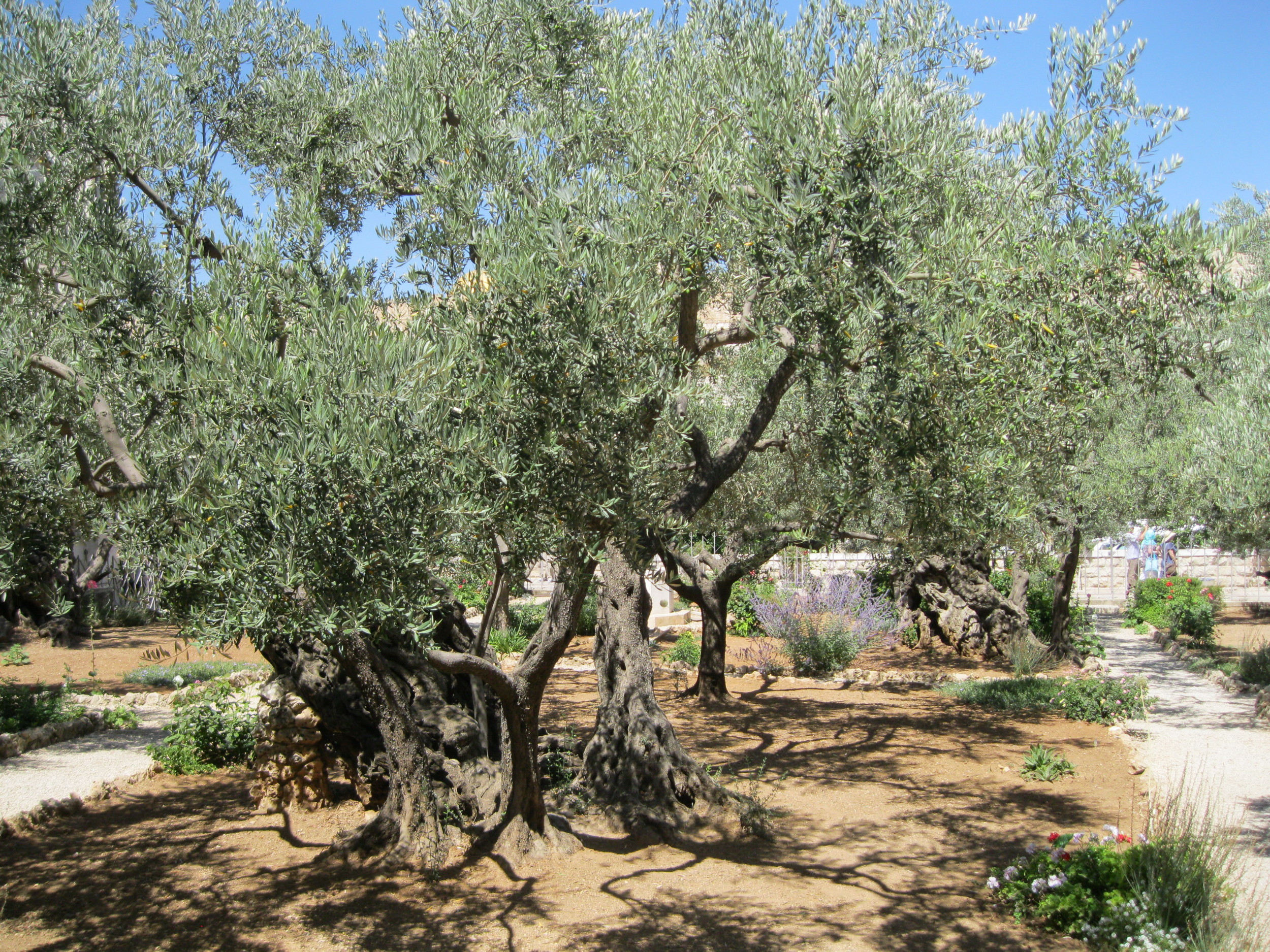The Significance of the Olive Tree - Devotional
The olive tree became part of the imagery of the Bible, used to describe God and His people in relationship.
The olive tree is one the plants most frequently mentioned in the Bible. In Deut. 8:8, God called the land of Israel "a land with...olive oil and honey." Judges 9:8-9 tell the importance of the olive tree in Jotham's parable where the other trees chose the olive tree to be king over them. The Bible often refers to the olive tree as beautiful (Jeremiah 11:16; Hosea 14:6) In Psalm 52:8, the faithful followers of God are compared to olive trees.
Olive trees have extensive root systems, spreading far beyond the reach of the leaves, to provide adequate moisture for them. Because their roots travel so far, these trees often stand alone, which accents their beauty. Olive leaves are gracefully narrow, light green on one side and an even lighter green on the other, and they shimmer beautifully in the wind.
Olive Trees in Garden of Gethsemene
The olive tree thrives throughout Israel. The ability of this tree to grow on rocky hills makes it well suited to the terrain of Israel. The tree grows exceptionally well on the cultivated hillside terraces of Judea and Samaria. Many of the hills of Upper and Lower Galilee are covered with olive trees to this day. They grow especially well in western Galilee.
Olive trees begin to produce olives when they are between 6 and 10 years old, and they reach their peak at about 40 to 50 years. Many continue to produce an abundance of olives even when they are hundreds of years old. When the trunk becomes large and old, the branches are trimmed off, leaving what appears to be a dead stump. But the next year, fresh shoots spring from the old stump, and soon a new and vigorous growth of branches again produces an abundance of olives.
This provided some of the rich imagery of the Bible. The children of God's people are compared to the many small shoots that spring continually from the root system of the tree, ensuring the continued existence of the fruitful family.
God used the metaphor of an olive tree (and sometimes other trees and vines) to describe his relationship to his people. He planted them as a farmer would plant a beautiful olive tree (Jeremiah 11:16-17; Psalm 52:8), but he said he would cut them down because the fruit they bore was the worship of Baal, which is another god (Jeremiah 11:17). After God allowed his people to be "cut down," they appeared to be nothing but a dead stump. But God and faithful Israelites knew better: Out of that stump came new shoots.
Another time a tree is cut down, is when it is old. There is too much trunk for the leaves. The following year, a new branch comes out of the old tree. New branches begin to grow and a new tree emerges. God compares the unbelieving nation of Israel to an olive tree…He says “you didn’t produce fruit. I fertilized you, I took care of you and I look and still see no fruit, so I cut you down.” But then….
Isaiah 11:1-2 says “Then a shoot will spring from the stem of Jesse, and a branch from his roots will bear fruit. The Spirit of the LORD will rest on Him.” Isaiah was likely talking about an olive tree. The new shoot is the new fruit, which is Jesus, the Messiah! (Or a branch out of Jesse). The stem (Gentiles) have been grafted in. A Gentile is anyone other than a Jew….simple as that. The roots are Jewish people (the stump). You, as a Christian Gentile, cannot exist and bear fruit without the roots. We are grateful to the Jews for our roots. The Messiah is the shoot or branch out of Jesse. It means that Jesus Christ is where you get life and energy. The key is that we produce the olives. In other words, we are to bear fruit.
The word for shoot in Hebrew is of the same root as Nazareth. Jesus parents went back to Nazareth in order that it might be fulfilled…He will be called a Nazarene. A Nazarene is someone from “Shoot town:…that is how the word Nazarene is translated! Jesus was indicating to us that He IS the Branch. Jesus came from Nazareth. He is the Branch.
This beautiful picture of God's people and the Messiah as an olive tree was completed by Paul. Paul reversed the image of the Jewish farmer who grafted a cultivated olive shoot onto the root system of a wild tree to take advantage of its ability to withstand a harsher climate. Israel, God's cultivated tree, had had some of its branches removed. In their place, God has grafted the branches of believing Gentiles. This provides the basis for Paul to remind the Gentiles of their Jewish roots, affirm God's continued love and concern for his Jewish tree, and warn people that since God had removed natural branches for not bearing fruit, how easy it would be for him to remove ones that had been grafted on (Romans 11:11-24).
The olive tree provides an excellent lesson for the Christian who is not Jewish. As Christians, we have Jewish roots, and Jesus is our Jewish Branch. When God broke down the wall separating Jews and Gentiles, He did not invite the Jews to become Gentiles; He invited the Gentiles to join the Jews, His people. The olive tree can be a constant reminder that Jesus is our source of life--He is our Branch. He sprang from Jewish roots, and so do we. The beautiful olive tree reminds us of God's love and his expectation that all his branches bear fruit in abundance.
Are you bearing fruit? Is your fruit shining and beautiful for Him? Can others see your healthy fruit?

